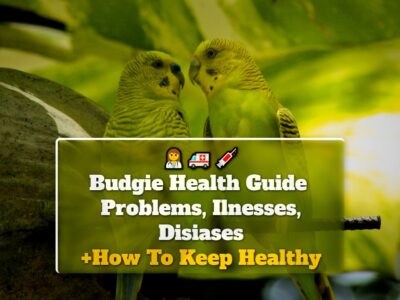Indeed, budgies can cause health problems in humans, though such instances are quite rare.
These can range from allergies and asthma, triggered by feather, dander, or droppings, to infectious diseases such as Psittacosis or Avian Tuberculosis, and even physical injuries leading to bacterial infections.
Budgie owners, and those considering bringing one of these vibrant birds into their lives, are the focus here.
I noticed a significant gap in available resources discussing potential health issues stemming from these feathered companions.
Drawing from personal experiences, various readings, I meticulously planned this content to fill that gap.
It’s a complete guide, shedding light on the health risks related to budgies.
Allergies And Asthma Triggered By Budgies:
The road to understanding allergies and asthma triggered by budgies is a winding one, but let’s embark on this journey together.
Budgies, these captivating birds with their chirpy songs and colorful feathers, can bring about an unwanted bout of sneezes and coughs.
This happens because budgies, like all birds, have certain elements that our bodies might perceive as threats.
Feather Allergies
Feathers, a signature aspect of our bird companions, can be the unexpected villain in our story.
You might notice a tickle in your nose when cleaning the birdcage or even when snuggling up with your pet.
This is often an allergic reaction to proteins found in the budgie’s feathers.
When these feathers shed and float around in the environment, they may lead to allergic reactions in people who are sensitive to these proteins.
Dander Allergies
Next, let’s uncover another cause of allergies: dander.
Dander is microscopic flakes of skin shed by birds, including budgies. It’s much finer than feathers and easily becomes airborne, infiltrating our living spaces.
In many cases, people aren’t allergic to the feathers themselves but rather to this dander.
Inhaling or coming into contact with dander can trigger an allergic reaction in some individuals.
Droppings Allergies
Another potential allergen is budgie droppings.
Budgies, like all birds, produce droppings that can dry up and fragment into dust particles.
These particles can mix with the air, and when inhaled, can induce allergic reactions.
This makes the cleaning and maintenance of bird cages an essential task for reducing potential allergen exposure.
Asthma Exacerbation
For people with existing asthma conditions, budgies might prove to be a bit more challenging to keep as pets.
The feathers, dander, and droppings can cause asthma exacerbation, meaning they can worsen asthma symptoms.
This happens because these allergens can trigger an immune response that narrows and inflames the airways, leading to an asthma attack.
Allergenic Asthma
As we journey further, we encounter allergenic asthma, a specific type of asthma triggered by allergens such as those found in budgies.
The symptoms can be similar to other forms of asthma, including shortness of breath, chest tightness, and coughing.
It is, therefore, vital for asthma sufferers to consider these potential implications before deciding to bring a budgie into their home.
Allergic Alveolitis (Bird Fancier’s Lung)
We reach allergic alveolitis, also known as Bird Fancier’s Lung.
It’s a serious lung condition that can develop in people who have prolonged exposure to bird allergens.
Symptoms can range from a chronic cough, shortness of breath, to even weight loss.
This is a reminder of the importance of understanding the potential risks associated with keeping birds, even pets as small and adorable as budgies.
Infectious Diseases Transmitted From Budgies To Humans:
Stepping into the realm of infectious diseases, it’s vital to acknowledge that our feathered friends, the budgies, might sometimes carry microorganisms that could potentially cause diseases in humans.
By understanding these risks, one can adopt necessary precautions to maintain both human and avian health.
Psittacosis (Parrot Fever)
The journey begins with Psittacosis, often termed as Parrot Fever.
Despite the name, it’s not exclusive to parrots.
Budgies, too, can harbor the bacteria Chlamydia psittaci, which causes this disease.
It’s mainly transmitted when a person inhales dust containing dried feces or respiratory secretions from an infected bird.
Psittacosis can present flu-like symptoms such as fever, chills, and headache, and in severe cases, it can lead to pneumonia.
Salmonellosis
Next stop, Salmonellosis, a bacterial infection that humans can contract from budgies.
The Salmonella bacteria can live in the digestive tract of budgies and get excreted in their droppings.
If a person inadvertently ingests the bacteria – perhaps by handling a budgie or its droppings and then not washing hands before eating – they may develop symptoms like diarrhea, fever, and abdominal cramps.
Cryptococcosis
Further down the path, we encounter Cryptococcosis, a fungal disease that can cause serious health issues, especially in individuals with compromised immune systems.
The fungus Cryptococcus, responsible for the disease, can sometimes be found in the droppings of budgies.
Infection occurs when a person inhales the fungal spores.
Campylobacteriosis
Then there’s Campylobacteriosis, another bacterial infection that humans can contract from budgies.
The Campylobacter bacteria, which might reside in the bird’s digestive tract, can spread to humans through contact with infected bird feces.
This infection can lead to gastrointestinal symptoms, including diarrhea, stomach cramps, and fever.
Avian Tuberculosis
Avian Tuberculosis, a disease that, while rare, can be transmitted from budgies to humans.
The Mycobacterium avium complex (MAC), responsible for the disease, can be present in the droppings, feathers, and respiratory secretions of infected birds.
Humans can contract the disease by inhaling the bacteria from these sources.
Symptoms can vary greatly but often affect the respiratory system and can cause weight loss and fatigue.
Physical Injuries And Associated Risks:
As we proceed further, we land on the topic of physical injuries that one can sustain from budgies.
Even though these cheerful birds are generally friendly, their interactions with humans might sometimes result in inadvertent harm, leading to certain health risks.
Bacterial Infections From Budgie Bites Or Scratches
Bacterial infections that might emerge from budgie bites or scratches.
Even though budgies are small birds, their beaks and claws can be sharp.
If a budgie gets frightened or agitated, it might bite or scratch, leading to skin breaches.
These wounds, if not properly cleaned and disinfected, can become infected with bacteria.
In some cases, these bacteria might originate from the bird’s mouth or claws.
Infection can result in redness, swelling, and pain around the wound area.
As we conclude this journey, it’s worth mentioning that while these potential risks exist, they are rare and preventable.
Maintaining a strong bond of trust with your budgie, handling them with care, and observing good hygiene practices can go a long way in ensuring both your budgie’s health and your own.
📺 Video About Pet Birds & Human Health
This video discusses the potential impacts of pet birds on indoor air quality and human health, focusing particularly on the United States where there are estimated to be over 20 million pet birds.
Faqs
Can Budgies Cause Respiratory Issues in Humans?
Yes, budgies can cause respiratory problems in humans, primarily due to allergens found in their feathers, dander, or droppings.
These allergens can trigger asthma attacks in those with the condition or cause allergic alveolitis, also known as Bird Fancier’s Lung.
Are Budgies Carriers of Any Infectious Diseases that Can Affect Humans?
Indeed, budgies can carry infectious diseases that can potentially affect humans.
Psittacosis, Salmonellosis, Cryptococcosis, Campylobacteriosis, and Avian Tuberculosis are some of the diseases that can be transmitted from budgies to humans, although such instances are quite rare.
Can Budgie Bites or Scratches Lead to Health Problems in Humans?
Yes, bites or scratches from a budgie can lead to health problems in humans.
Physical contact might result in skin breaches which, if not properly cleaned and disinfected, can lead to bacterial infections.
In rare cases, it can also lead to Avian Pox if the bird is infected.
How Can We Prevent Health Problems Caused by Budgies?
Most health problems caused by budgies can be prevented by maintaining good hygiene practices, properly caring for your bird, and regularly cleaning their cages.
Those with allergies or asthma may need to take additional precautions such as using air purifiers and avoiding close contact.



